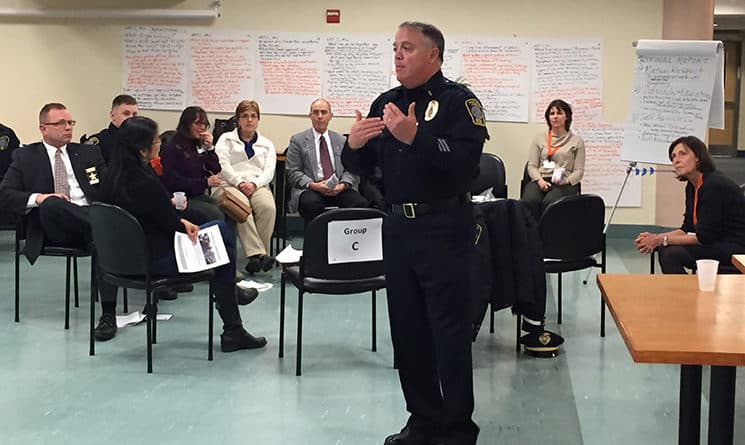At a community conversation between Dover police and city residents last week, there was an elephant in the room — or, more accurately, a BearCat. When Dover city councilors voted on March 11 to accept a Homeland Security grant to purchase a BearCat armored vehicle, a dozen residents turned out at a city council meeting to protest the decision.
After protests last summer in Ferguson, Mo., the vehicle has become a symbol of what critics say is the over-militarization of municipal police departments. In New Hampshire, BearCat purchases have generated debates in Concord and Keene in recent years, and at the State House, legislators have looked at bills to either study or prohibit police departments purchasing such vehicles.
And so the BearCat, militarization, how police interact with minority communities, and how residents and police perceive officers’ roles in the community dominated the conversation inside the McConnell Center cafeteria on Thursday, March 26.
The meeting was hosted by New Hampshire Listens, which also hosted a community conversation in Durham on March 30. A third event is scheduled for Rochester on Thursday, April 2.
“It’s not easy to be a police officer and it’s not easy to be in a profession that people feel negatively about.” — Michele Holt-Shannon
of New Hampshire Listens
It was meant to be a “proactive conversation,” said New Hampshire Listens associate director Michele Holt-Shannon, though she added that news reports about police practices in Ferguson, New York City and other communities around the country played a part in scheduling the discussions.
“It’s not easy to be a police officer and it’s not easy to be in a profession that people feel negatively about,” she said.
There were some 50 participants — including teachers, teenagers, city officials, and a large contingent of Dover police and Strafford County sheriff’s department officers. Participants split up into four groups. Each group received a packet of information that included policing standards guidelines, data on training and officer safety, and statistics about crime rates and citizen complaints against police in Dover, Durham, and Rochester in 2014. That information helped launch discussions about how police are perceived, the roles officers play in the community, and how police departments and communities can work together to build trust.
The discussion addressed how officers handle their own prejudices and how departments can build trust with the community. Groups talked about hiring standards and how police departments vet potential officers. Dover state Rep. Len DiSesa, a former deputy police chief in Portsmouth, said bad hiring practices were to blame for the recent high-profile complaints against police involved in shootings of minorities in Ferguson, and Cleveland, Ohio.
The meeting was also a chance for residents to offer suggestions directly to police. During the discussion, one participant advised Dover police Chief Anthony Colarusso to do more to reach out to immigrants in the city, possibly by making presentations at English-as-a-second-language classes at the Dover Adult Learning Center — something Colarusso said he’d work on scheduling.
Meanwhile, Colarusso said the department takes all complaints about officers seriously, whether filed formally at the police station or mentioned during public forums at city council meetings.
And, of course, the BearCat came up. Colarusso likened it to a ballistic vest and noted that the department already had a similar vehicle — a 1982 Peacekeeper armored truck that recently broke down. It’s a tool, he told participants in his group, that’s meant to protect officers, not intimidate citizens.
Each group compiled a list of common themes and suggestions that were then shared with the rest of the participants. There was a lot of overlap among the groups, and most of the suggestions touched on ways police departments can reach out to the community, whether it’s through talking publicly about hiring and training requirements, inviting residents on ride-alongs (something the department already does), or being transparent about how citizen complaints are handled.
The next listening session takes place with Rochester police on Thursday, April 2 at 6 p.m. at the Frisbie Memorial Hospital conference center, 11 Whitehall Road, Rochester. Register at nhlistens.org.
Top of page: Dover police Lt. David Martinelli shares his group’s findings at a listening session on March 26. (Photo by Larry Clow)

